Ford Pinto Car history
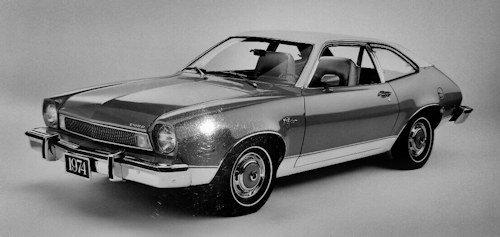 |
|
|
Manufacturer |
Ford |
|
Production |
1970 to 1980 |
|
Class |
Motor car |
|
Body |
2-door sedan and delivery |
|
Layout |
Rear wheel drive |
|
Engines |
(1.6 L) Kent 4 cylinder |
|
Wheelbase |
94.0 in (2,388 mm |
|
Length |
163 in (4,140 mm) |
|
Width |
69.4 in (1,763 mm) |
|
Height |
50 in (1,270 mm) |
|
Curb weight |
2,015–2,270 lb (914–1,030 kg) |
The Ford Pinto was an American car manufactured by the Ford Motor Company from 1970 to 1980.
History
The Pinto is a full four seater offering high standards of comfort and space. Rack anci pinion steering is fitted taking only tour turns from lock to lock and giving a turning circle of 31.5ft. In standard form the Pinto is powered by an OHV 1600cc engine made by Ford of Britain. The car featured on the stand has the optional overhead cam two-litre engine.
The car soon earned the reputation as the "Car Killer". This was due to the fact that when the car was rear-ended, there was a high probability that it would catch fire and furthermore, due to the deformations that the weak chassis underwent, even at low-speed impacts, the doors often locked, making it impossible to escape from the car. The reason for the development of the Pinto was that Ford wanted to offer an alternative to the increasingly successful imported small cars. Particularly successful in those years was the VW Beetle, but also the sales of Japanese manufacturers increased from year to year. Almost simultaneously with the Pinto came GM with the Chevrolet Vega and AMC the AMC Gremlin on the market, which aimed at the customer base for compact cars.
The Pinto was slightly changed as well as Mercury Bobcat they offered this rebadged version of the Pinto as the Mercury Bobcat from 1975 to 1980. So that the Pinto could be offered as cheap as possible, it had to be produced at low cost. The Pinto was the first American Ford for decades again a four-cylinder engine. This engine was also used in Europe and is known as a Pinto engine or "OHC engine". The related knowledge, a gasoline engine with four cylinders, which was used in many cars of the Ford Motor Company and named after the Ford Pinto, for which it was originally developed. In Europe, this was first installed in 1970 in the Ford Cortina of the third series and Taunus. At Ford, the pinto engine was officially called OHC (overhead camshaft). Later in 1975, Ford introduced the 2.8 L V6 to the range.
- PERFORMANCE: 1,599 cc 54 hp
max power (DIN): 54 hp at 4,600 rpm
max torque (DIN): 81 1b ft, 11.2 kg m at 2,400 rpm
max engine rpm: 5.000; 33.8 hp/l
power-weight ratio: Pinto 2-dr, sedan 4t lb/hp. 18.6 kg/hp
speed in direct drive at 1,000 rpm: 15 mph, 24.1 km/h
fuel consumption: 25.4 m/imp gal, 21.2 m/US gal, 11.1 1 x 100 km. - PERFORMANCE :83 hp 2,000 cc
max power (DIN): 83 hp at 5,200 rpm
max torque (DIN): 98 1b ft, 13.5 kg m at 3,800 rpm
max engine rpm: 5,600; 41.5 hp/l
max speed: about 92 mph, 148 km/h
power-weight ratio: 30 lb/hp, 13.6 kg/hp
speed in direct drive at 1,000 rpm: 15.2 mph, 24.4 km/h
fuel consumption: 23 m/imp gal, 19.1 m/ US gal, 12.3 1 x 100 km. - PERFORMANCE: 85 hp 2,000 cc
max power (DIN): 85 hp at 5,600 rpm
max torque (DIN): 98 1b ft. 13.5 kg m at 3,800 rpm
max engine rpm: 6,000; 42.5 hp/l
max speed: about 95 mph, 153 km/h
power-weight ratio: Pinto 2-dr. sedan 26.8 lb/hp, 12.2 kg/hp
speed in direct drive at 1,000 rpm; 15.2 mph, 24.4 km/h
fuel consumption: 22.2 m/imp gal, 18.5 m/US gal, 12.7 1 x 100 km.
The Pinto came in three body styles which include a two-door fastback sedan, a three-door hatchback, and a two-door station wagon. The Pinto body came with 4 seats, separate front seats with back seat folding down to luggage table these came standard for runabout. estate car/station wagon has 2+1 doors also has separate front seats; back seat folding down to luggage table.
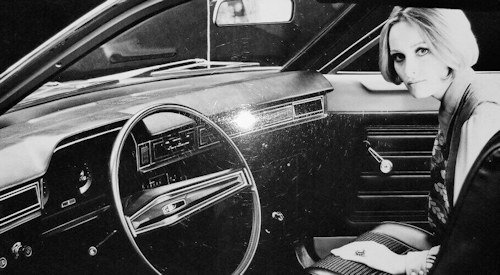
The Ford Pinto at first as only a fastback sedan with rear trunk. Later by 1971 hatchback became available. By early, 1972, the 2-door Pinto station wagon was added to the range. From the start There are 16 colour combirations available for Pinto from Model T Black to Pinto Gold. Colour—keyed carpeting, houndstooth check cloth seat covering or comfortable vinyl seats add to the creature comforts. The rear seat folds down to provide a total area of 38 cubic feet.
In 1974, as with all American cars from the time to meet federal regulations, more heavy bumpers were added to both the front and rear. The 1976 Pinto Stallion came with black hood and wheel arches plus rocker paneland textured a grille. large emblems on front fenders along with black mouldings for windows and door trims with racing mirrors uprated suspension and A70x13 tyres with white lettering By 1977, the Pinto received significant updates styling updates with parking lamps, tail lamps, and grille changes. The last updates again in 1979 saw more styling updates inside and out, new grilles hoods and fenders. with rectangular headlamps, the interior was also updated along with the dash that now features a rectangular instrument cluster. Sedans have new tail lights.
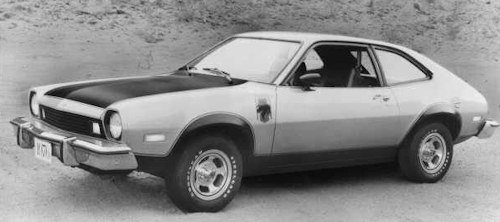
During its construction period, there was a scandal around the model, as it turned out that the rear of the vehicle was designed so that in rear-end collisions could easily damage the gas tank. Leaking gasoline significantly increased the risk of fire in accidents. There were several fires that ended fatally for some passengers. In the course of the investigations, internal written reports became known that Ford was aware of this vulnerability, but did not want to bear the cost of a design change. Instead, it was unofficially argued that it would be more cost-effective to accept possible litigation after death and to pay the appropriate compensation. The normal layout of a unibody construction, a longitudinally mounted engine in front with rear wheels driving the cars.
With manual or automatic transmission options and live axle rear end. Suspension was by unequal-length control arms with front coil springs; the live rear axle was suspended on leaf springs. The rack and pinion steering optionally had power assist, as did the brakes depending on model options such as A78 x 13 tyres; A70 x 13 and 175B x 13 wheels with 5" wide rims; sunshine roof; vinyl roof; tinted glass; tinted rear window; electrically-heated rear window; air-conditioning; light alloy wheels.
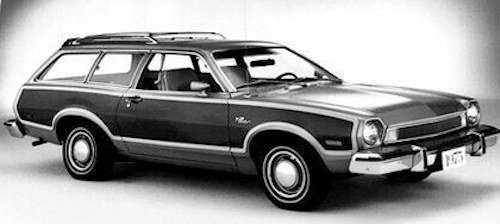
Accent Group equipment with more deluxe interior with wood-tone trim; Sports Accent Group equipment; Convenience Group equipment with white exterior paint and choice of two-tone orange or avocado accent paint; Luxury Decor Group equipment; back seat folding down to luggage table only for 2-dr. sedan.
The Squire equipment features faux wood side panelling 4-speed fully synchronized mechanical gearbox; vinyl roof and sunshine roof not available.
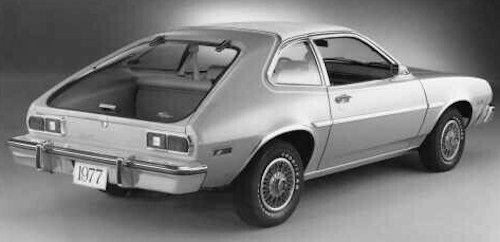
Technical
-
Ford Pinto Technical details and specifications (1970-1980)
TRANSMISSION
driving wheels: rear
clutch: single dry plate
gearbox: mechanical: gears: 4, fully synchronized
gearbox ratios: I 3.650, II 1.970. III 1.370, IV 1, rev 3.660
Option ratios: (I 3.540, II 2.400, Ill 1.410, IV 1, rev 3.960)
Option: Select-Shift Cruise-O-Matic automatic transmission
automatic ratios (I 2.460, II 1.460, III 1, rev 2.200),
final drive: hypoid bevel
axle ratio: 3.550
axle ratio 2,000 cc: 3.400CHASSIS
type integral
front suspension: independent, wishbones, lower leading arms, coll springs, telescopic dampers
rear suspension: rigid axle, semi-elliptic leafsprings, telescopic dampers.STEERING
rack-and-pinion
turns lock to lock: 4.16.
turning circle (between walls): 35.9 ft' 10.9 mBRAKES
1,599 cc : drum; swept area: total 191 sq In, 1,232 sq cm
2,000 cc :front disc (diameter 9.30 in, 236 mm)rear drum
swept area: front 156.7 sq in, 1,011 sq cm, rear 98.5 sq in, 635 sq cm, total 255.2 sq in, 1,646 sq cm.ELECTRICAL EQUIPMENT
12 V
45 Ah battery (Option) 54 Ah battery
38 Alternator
Motorcraft distributorDIMENSIONS AND WEIGHT:sedan, runabaout
wheel base: 94.20 in, 2,393 mm
tracks: 55 in. 1.397 mm front, 55 in, 1,397 mm rear
length: 164.50 in, 4.178 mm
width: 69.40 in, 1,763 mm
height: 49.60 In. 1,260 mm
ground clearance: 4.80 in, 122 mm
dry weight: Pinto 2-dr. sedan 2,216 1b, 1,005 kg - 3-dr. runabaout 2.254 1b, 1.067 kgDIMENSIONS AND WEIGHT: estate car/station wagon
length: 173.80 in, 4,414 mm
width: 69.70 in, 1,770 mm
height: 51.30 in, 1,303 mm
dry weight: 2,490 1b, 1,129 kg
fuel tank: 9.9 imp gal 12 US gal, 45 1.ENGINE: 1,599 cc
Location front, 4 stroke; 4 cylinders, in line
97.5 cu in, 1,599 cc (3.19 x 3.06 in, 80.9 x 77.6 mm)
compression ratio: 8.1:1
cast iron cylinder block and head:
5 crankshaft bearings
valves: overhead, in line. push-rods and rockers
camshafts: 1, side
lubrication: gear pump. full flow filter
Ford 9510 731-BDA downdraught single barrel carburetor cleaner air system
fuel feed: mechanical pump
water-cooled.
13 imp pt, 15.6 US ptENGINE: 2,000 cc
122 cu in, 2,000 cc (3.58 x 3.03 in, 90.6 x 76.9 mm)
compression ratio: 8.2:1
camshafts: 1. overhead
1 Holley-Weber 9510 D3ZF-AB downdraught twin barrel carburettor; cleaner air system© Motor car History
Service
-
Ford Pinto maintenance and Service Guide (1970-1980)
1,599 cc lubricating system capacity: 5.8 imp pt. 7 US pt.
2,000 cc lubricating system capacity: 8.3 imp pt, 9.9 US pt
1,599 cc cooling system capacity: 13 imp pt, 15.6 US pt
2,000 cc cooling system capacity: 14.1 imp pt, 16.9 US pt
width of rims: 4"
width of rims 2,000 cc: 5"
tyres: 6.00 x 13.
fuel tank: 9.2 imp gal, 11 US gal, 42 1.© Motor car History
